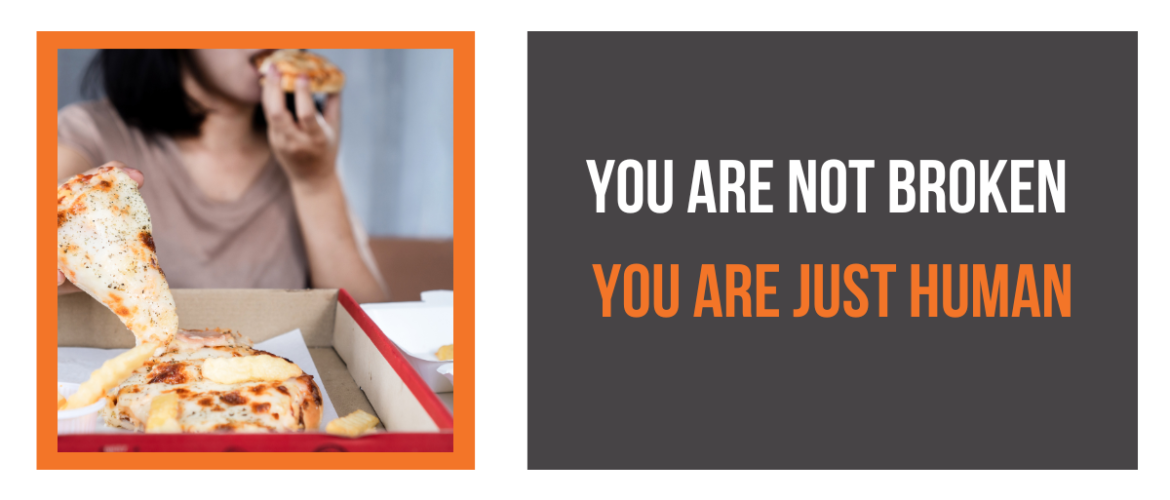GET IN TOUCH TODAY!
"*" indicates required fields

Binge eating is a serious and common disorder affecting millions worldwide. It is characterised by uncontrollable overeating, often followed by feelings of guilt and shame. For many, this behaviour can feel like an inescapable cycle. However, by understanding how the brain drives binge eating urges, we can begin to dismantle the patterns that sustain this behaviour. Drawing from Brain Over Binge by Kathryn Hansen and Rational Recovery by Jack Trimpey, this article explores how the brain influences binge eating and how we can regain control.
Binge eating disorder (BED) is defined by episodes of consuming large amounts of food in a short time, often accompanied by a sense of loss of control. This is different from emotional eating or overeating, which may happen occasionally in response to stress or comfort-seeking. People with binge eating disorder experience regular, overwhelming urges to eat far beyond physical hunger, leading to distress.
While many view binge eating as a purely emotional or psychological issue, recent insights suggest that it is deeply connected to brain functions, particularly the part of the brain responsible for survival instincts.
At the core of binge eating is a primitive part of the brain often referred to as the lower brain, or the “reptilian brain”. This area is responsible for basic survival mechanisms such as hunger, fear, and reproduction. In her book Brain Over Binge, Kathryn Hansen explains that binge eating is driven by the lower brain’s misguided survival instinct. The lower brain creates powerful urges, perceiving food as something necessary for survival in excessive amounts, even when it is not.
These binge urges feel automatic because they arise from the lower brain. They often overpower logical thinking, which resides in the higher brain (prefrontal cortex) where reason and self-control exist. Understanding this division is crucial to recognising that binge eating is not a reflection of weak willpower but rather the misfiring of survival instincts.
Jack Trimpey’s Rational Recovery, originally focused on substance addiction, provides valuable insights into how we can approach urges that seem uncontrollable. Trimpey explains that addictive behaviours, whether related to alcohol, drugs, or food, are often driven by the brain’s attempt to satisfy an ingrained impulse. In binge eating, this can be understood similarly—our brain is tricked into believing that overeating is essential for survival.
In Rational Recovery, Trimpey introduces the concept of the “beast”, which is the voice of addictive impulses, and shows how we can separate our rational thoughts from this inner drive. Applying this to binge eating, the lower brain’s urges can be seen as the “beast” creating cravings, but it does not have the power to force us to act. The key is recognising that the urge is not “you” but a misdirected brain impulse.
Both Brain Over Binge and Rational Recovery offer strategies for overcoming binge urges by developing awareness of how the brain works. Hansen stresses that once we understand binge urges come from the lower brain, we can detach from them. The higher brain is capable of recognising these urges as mere impulses and choosing not to act on them.
Similarly, Rational Recovery teaches a method of cognitive self-control. Trimpey suggests using rational thought to identify and dismiss urges, effectively reprogramming the brain’s response to these survival-based impulses. Instead of trying to “fight” the urge, individuals are encouraged to view it objectively and make a conscious choice to ignore it.
Breaking free from binge eating requires both awareness and action. Here are several steps based on the principles from Brain Over Binge and Rational Recovery:
Understanding the brain’s role in binge eating is crucial for overcoming it. By recognising that binge urges are a product of the lower brain’s survival instincts, and not a reflection of personal failure, we can begin to separate ourselves from those urges. Using the principles outlined in Brain Over Binge and Rational Recovery, individuals can regain control, learning to view urges as temporary impulses and actively choose not to follow them. With time, this new mindset can transform both the brain’s responses and one’s relationship with food.
If you’re ready to take control of your client’s health and performance, our upcoming course, Nutrition Mastery: Unlock Health and Maximise Performance, is launching soon! It covers everything from optimising nutrition for energy and performance to managing weight—and includes crucial insights into binge eating and how to break the cycle. Make sure you are subscribed to our emails so you don’t miss the launch. In the meantime, check out our other courses.
"*" indicates required fields